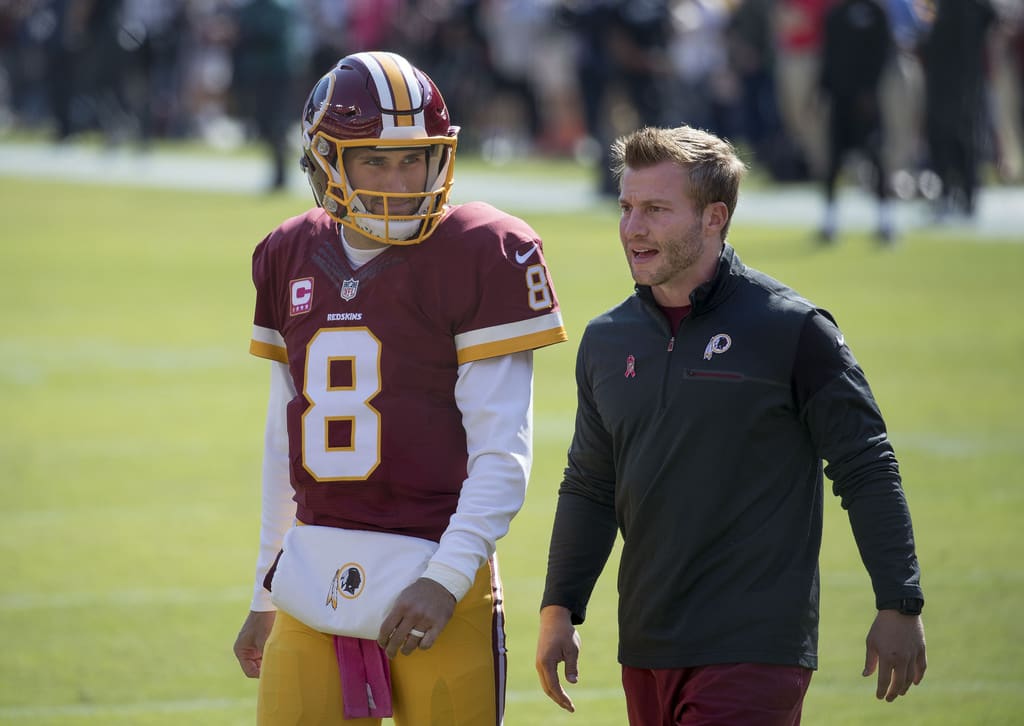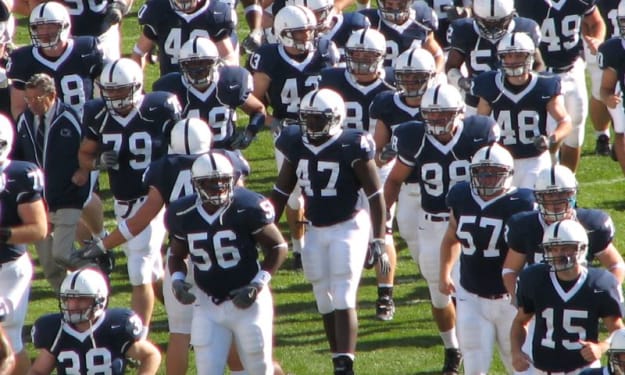Sean McVay’s Success Exposing the Biggest Red Flag a Head Coach Can Have
Is it always good for a coach to be liked by his players... or can it sometimes be bad?

On December 12, 2016, Jeff Fisher informed his coaching and playing staff he’d been fired as Head Coach of the Los Angeles Rams, after a 42-12 loss to the Atlanta Falcons, the team’s ninth from thirteen games.
The room was silent in devastation. Assistant coach Mike Singletary got up to thank Fisher, and hug him. The rest of the coaching staff followed. Running back Todd Gurley sat inconsolable, silently weeping with his head bowed.
When Fisher left the room, a tearful Johnny Hekker addressed his teammates.
“That’s our f-cking fault, man. Y’all just lost the greatest thing next to this team. Y’all ain’t ever going to play in front of a Head Coach like that,” the then-fifth-year punter said.
The very next season, Hekker would find out how wrong he’d be. With Sean McVay, Fisher’s 30-year-old replacement, the young coach proved that being liked in a locker room does not automatically correlate to wins.
In Fisher’s case, his reputation as a “player’s coach” was where Los Angeles had gone wrong in the first place. So indelible was his reputation, the chorus of public shock and sadness over Fisher’s firing echoed in this vein.
Kevin Dyson played for Fisher with the Tennessee Titans from 1998 to 2002. He was the man who almost gifted him a Super Bowl ring in 2000, when he was famously tackled one yard short of the championship-winning touchdown as the clock hit zero.
http://www.realclearsports.com/images/wysiwyg_images/regrettabledraftpicks/kevindyson.jpg
Even he, a member of Fisher’s most successful team in his 22-year-career, supported the narrative, describing him as “player-friendly.”
“I think the luxury he had with our team was we were a veteran-led team… but nonetheless, he was just good at managing a bunch of egos,” Dyson said.
“I was afraid to mess up, not necessarily because Jeff Fisher was going to say something to me, but because Eddie George was going to speak up, or Brad Hopkins or Bruce Matthews or Blaine Bishop or Marcus Robertson or Eddie Robinson."
“With all these veterans, when you came in, you didn’t want to disappoint them, and that was kind of how that team was.”
Fisher’s player and people management skills are not in question. You don’t stick around in a results-driven business for over 20 years without them, but nowhere did Dyson make mention of Fisher’s ability to, you know, coach football.
This may be harsh, given his squads have averaged almost eight wins a year over 22 years, despite only six winning seasons. His career win percentage of .510 is also a decent clip.
However, over a fairly large sample size, it’s clear Fisher’s popularity with the players was usually never good enough for any more than eight wins a season — or only good enough for that many.
If an “elite team” makes a Conference Championship game, Fisher only coached two elite teams in his entire career, both veteran-heavy Dyson-led squads in 1999-00 and 2002-03.
Fisher may have been popular, even loved, by the players, but unfortunately, it had little to no impact on his team’s on-field performance.
You may be able to get inside the head of each and every one of your 53 players, leave a salient mark, and inspire a team to perform, but if what they’re being taught outside meeting rooms is not good enough, then neither is your coaching.
In fact, it may even be damaging, and that’s when Sean McVay comes in.
As the youngest Head Coach in modern League history, McVay does not have the runs on the board like Fisher. He didn’t he play in NFL like his predecessor.
Unlike Fisher, he had respect to earn. He didn’t have a track record hovering above his head like a halo, and contrary to expectations, this has done wonders for McVay, where it absolutely failed his precursor.
It was clear to McVay his new team needed a culture change, and that’s exactly what they got.
“Obviously, we needed a culture change. The place has a totally different vibe,” linebacker Alec Ogletree told ESPN.
“Everybody stands up a little straighter. They start taking notes on his words (sic),” safety Cody Davis added.
“Even the smallest thing, if it’s not right, [we’re] going to rerun it to get it right, to make it perfect,” linebacker Mark Barron said.
It’s a wide departure from the "Victory Mondays" Fisher held, where practice sessions after a win would be lighter.
In the words of ESPN’s Alden Gonzalez:
“McVay joined the Rams with a clear vision for what his team would represent, but he was able to integrate it with the best of what the organization already had.
“He took control, but he empowered others. He pushed his players, but not harder than he pushed himself. He communicated his message, but he also listened. He built a following, but he never demanded it.
“He set the standard, but he put the onus on others to uphold it.”
Gonzalez made out McVay to be almost a carbon copy of Fisher and his best attributes, but in that last stanza, the door is busted wide open on what differs the 31-year-old from his 59-year-old forerunner.
McVay is able to both set standards and uphold them. He doesn’t rely on his team’s veterans to do so. In fact, he was prepared to slap the maximum fine allowed on Ogletree were he late to a team meeting.
Higher standards and expectations, as well as more accountability and greater energy, were all apparent to McVay as lacking areas as soon as he begun as Los Angeles’ new Head Coach. The players told him so in their exit meetings last year.
These are all be criticisms on where the players thought their old HC was lacking, and the customer is always right.
Fisher’s reputation found him unable to uphold the players he loved to the standards they needed. His reputation as a player’s coach preceded it.
Never mind McVay was touted as an offensive whiz, and has literally turned Jared Goff’s quarterback career on a dime. He’s already doubled his passing yards in the new offensive scheme, through just one more game than he’d played last year.
Never mind the team’s 6-2 record, already two wins better than last year with half the season still to come. McVay’s first mission was to simply work his players harder.
In his second meeting as Head Coach, McVay announced the changes he would be making, including no more Victory Mondays, rigorous fitness sessions, practice routinely tougher than games, and non-negotiable fines for failing to meet standards.
John Fassel, the Special Teams Coordinator who stood in as Interim Head Coach between Fisher and McVay, described the difference between how the two men garnered respect.
“[McVay] didn’t ask for buy-in. He just went about his daily business from the start — this is what we’re doing — and the buy-in happened.”
Ultimately, this whole article could be about the differences between Fisher and McVay. However, the only difference that matters is Fisher’s team finished second-last in the NFC West in 2016, while McVay’s sits top.
There were no major personnel changes. Their quarterback is only one year older, and one year wiser. Their Head Coach is far less experienced.
Were McVay to leave town today, the players may not cry the way they did when Fisher left, but they would certainly realise they’d lost a better coach.
In 2017, a player’s affection for a coach is irrelevant. Football has become too complicated, as have all sports, for the mantra of “love conquers all” to apply any longer.
This is not to say fondness is the enemy of a successful team. Nature says the closer a team is, the harder they will fight for each other. Sooner or later, the Rams will learn to love McVay, although it will be different to how they loved Fisher.
As with any emotion, love is infectious, and a team’s love for a good Head Coach will only make them more dangerous. If a team is allowed to love a poor coach, they will ultimately die a slow death.
About the Creator
Myles Stedman
Journalist at Rugby.com.au | NEAFL media team
Contributor at Zero Tackle, RealSport, The Unbalanced, FanSided, Last Word on Hockey and SB Nation.






Comments
There are no comments for this story
Be the first to respond and start the conversation.